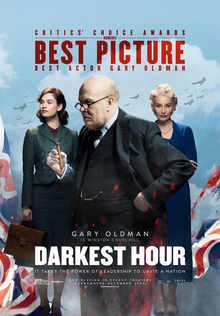
This film gained our attention when we caught one of its trailers in the cinema and of course as a serious film it went on to be nominated for several Oscars. I’m not sure we would have been interested in this ordinarily but we had a free evening in KL recently and as I knew that this was only shown in a limited number of places in Malaysia, we took the opportunity to watch it.
In 1940, it becomes clear that Adolf Hitler’s aggression knows no limits and so the opposition Labour Party calls on Neville Chamberlain to resign as Prime Minister of the United Kingdom. Both parties compromise on Winston Churchill though the Conservative Party still regards Chamberlain as its leader and many, including King George VI, harbour reservations over Churchill due to his poor record in the First World War. At the same time, as Churchill enters office, he works with a new secretary Elizabeth Layton who offers a commoner’s perspective on the proceedings. As the scale of the French military defeat becomes clear, pressure mounts on Churchill to at least open negotiations with Hitler, especially from the Earl of Halifax who wishes to succeed Churchill as Prime Minister. Eventually the entire British army is forced to retreat onto the beaches of Dunkirk, leading Chamberlain and Halifax to threaten the collapse of the government unless Churchill agrees to negotiate a treaty with Hitler.
A big surprise for me was the very limited scope of this film. It takes place entirely within the span of mere days between Churchill’s appointment as Prime Minister and the beginning of the Dunkirk evacuation. It also takes almost entirely in London. Barring some shots of the poor 30th Infantry Brigade that Churchill orders to fight to their deaths, it doesn’t show any action at all though plenty of it happens offscreen. Instead this film offers plenty of Churchill both at his best and at his worst. Predictably the most famous speeches of the great statesman all make an appearance but a lot of effort is also made to capture the man’s darker side, his temper and fondness for fine food and drink, his surliness at finally being named Prime Minister at so late an age, and his depression when seemingly every other member of his War Cabinet counsels peace with Nazi Germany. Gary Oldman has a grand time showing off his acting skills here and director Joe Wright certainly makes him work hard for his paycheque.
Unfortunately this is all that Darkest Hour has going for it. Its narrow scope and the lack of any original angle into the character of Churchill makes the film feel insufficient. In fact, watching it in the cinema I felt a distinct sense of disbelief from the audience as the credits started rolling as if we were all collectively asking if this is all there is to the film. I also found myself being annoyed by the unnecessary visual flourishes the director insists on using. Panning the camera straight up and having a character look straight up at it looks suitable cool, once. Pull the same trick over and over again and you start giving the impression that you’re running out of material to show the audience.
An even more serious problem for this film is how it takes liberties with the historical record. While it is true that Chamberlain and the Earl of Halifax urged Churchill to consider diplomatic alternatives, it seems dishonest to frame this as a make or break moment for the government. It’s hardly realistic that the mere opening of negotiations would be reason enough to cease hostilities and the thought of allowing the entire British army to be taken prisoner in the meantime is laughable. Furthermore, the all important scene onboard the subway train seems to be entire fictional. Personally I am also leery of calling this moment Britain’s darkest hour when we already know that London would be subjected to intense bombing that would last for months and cause untold death and destruction. Wouldn’t surrender be an even more tempting option at that point with hundreds of civilians dying every day? Given these inaccuracies, it is very hard to imagine what reason this film has to exist.
All told while there is some admirable craft in this film and Gary Oldman’s performance alone is almost worth the price of admission, this is just not that good a film. As one Broken Forum member commented, it feels like a naked Oscar grab without any of the depth needed to back it up.